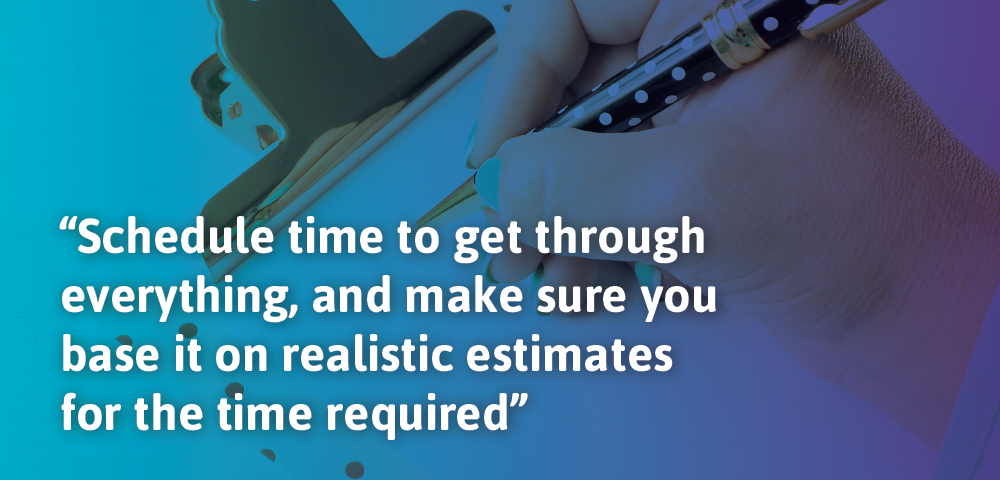The balancing act of work/life balance: how you can do it all and stress less
This Stress Down Day, we’re here to help you gain back some equilibrium at work and stress less along the way.
Research shows that 90% of Australians need to stress less, with 74% of people reporting being stressed from work.
While some level of stress is normal, too much stress can lead to a long list of negative health impacts.
And as the owner of a small business, you have more responsibilities than the rest of your team, so it can be beneficial to know how to handle stress in your business.
There’s no time like the present to make sure that the see-saw of work/life balance is in harmony.
Let’s have a look at some of the ways you can avoid running the risk of burnout, while still managing a successful small business.
1. Smarter time management
Overworking and working excessively long hours could take a toll on your health. One way to address this is to manage your time more effectively and work smarter rather than harder.
One way to better manage your time is to reassess how you engage with social media. It is hard to escape the world of social, which is why it is important to limit the amount of time you spend on it, in order to avoid stress and burnout. This will help you to remain productive each day, whilst at the same time, be happier at work.
2. To-do lists
Work to a daily or weekly to-do list. The list should set out your tasks in order of priority. Schedule time to get through everything, and make sure you base it on realistic estimates for the time required. It’s always best to overestimate the time required than to have too little time, which could create more stress.

3. Use the right tools
Review your tools and consider whether you have the right tools to do your job as the owner of the business. Sometimes this might not be as obvious as it seems. Upgrading your hardware and updating software could make a significant difference in how effective you can be in your role.
Whether it’s online catering software, facilities management software, or an e-commerce platform—these can all work and streamline decision-making by providing customised reports that can give you a detailed view of your operations. These could lead to life hacks like time savings and a reduced workload for managers and employees.
4. Delegate and outsource
Assess your daily responsibilities and consider what you can outsource or delegate. Anything nonessential to your responsibilities and anything that doesn’t have to be carried out by you could be outsourced to contractors or delegated to trusted employees. By delegating and outsourcing, you as the boss, are learning to say “no to overwork.”
5. Managing stress at work
The first step might be as simple as recognising you do have work-related stress and deciding to do something about it.
- Seek support: Whether it’s talking to your partner, friends or even a professional coach, have someone you can freely talk to about stress at work. The act of confiding in someone can be a relief. Additionally, your friend or partner or coach can put things in perspective, allowing you to get some emotional distance from the sources of stress.
- Journal and reflect: Writing in a journal is another effective strategy to relieve stress. Write about the causes of stress and potential solutions to them. Explore what you worry about most often and why, whether it’s your workload, people issues, or something else. When journaling, you can write in paragraphs or use bullet points if you find it easier.
- Exercise: Can help reduce stress, so make an attempt to get active with some aerobic activity like brisk walking, jogging or swimming. You can even do some light exercise while at work to unite the team. Either way, find something you enjoy doing, whether it’s a group activity or something you can do on your own.
- Eat healthfully: Your diet can have a positive impact on your immune system and mood, so make an effort to eat balanced meals and avoid processed foods. Foods high in vitamin C could support a healthy immune function, while foods with healthy fats like olive oil and fish could boost your mood.
- Relaxation techniques: Relaxation techniques could relieve the symptoms of stress and help you take time out. Try techniques like relaxed breathing and progressive muscle relaxation to get started.
- Schedule breaks: Taking regular breaks can allow you to be more productive than working right through the day. Ensure you spend a few minutes away from your desk by going out for a quick walk, listening to some music, or having a chat with someone. You could also sit back in your chair, close your eyes and breathe deeply for a quick break.
- Practice mindfulness: Mindfulness practices like meditation could help you deal with stress more effectively. Try guided recordings or explore the different meditation techniques to see what works best for you.
When things get unbalanced
We’re only human after all and unfortunately, anyone can fall victim to an unforeseen accident or bout of illness, no matter how much we try to look after ourselves.
Stress can eventually impact your health which might mean you can’t work. Even something as simple as playing a game of backyard footy with the kids or doing some routine maintenance around the house on the weekend could result in accidental injuries, costing you precious time off without an income.
Chances are you cannot really afford not to be working, and if injury or illness was to strike, how could you keep paying the bills, ensure you have enough money for recuperation and still afford a decent lifestyle?
Personal Accident and Illness insurance covers* you for loss of income if you were unable to work as a result of an injury or illness. The cover is generally available regardless of whether or not you sustain an injury or develop and illness due to your work.
If you were temporarily unable to work due to the accident or illness, your cover could even pay you a benefit of up to 85% of your salary.** Plus Personal Accident and Illness insurance will typically provide benefits for permanent disablement and even death.
Keep your business in balance and receive a free tailored quote for Personal Accident and Illness insurance today!
**Maximum limits apply
This information is general only and does not take into account your objectives, financial situation or needs. It should not be relied upon as advice. As with any insurance, cover will be subject to the terms, conditions and exclusions contained in the policy wording. © 2025 BizCover Limited.






